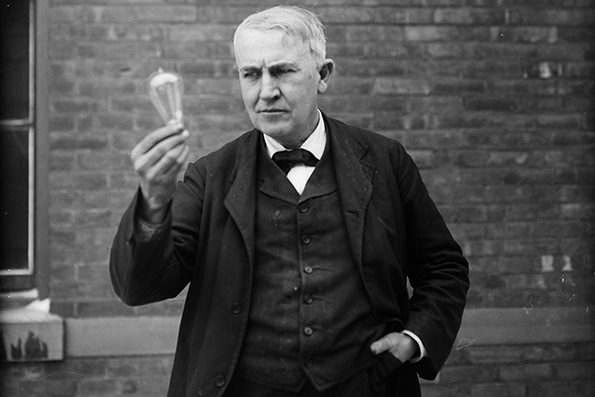In the end, it wasn’t close. Hillary Clinton took 92.8 percent of the vote, Donald Trump only 4.1 percent, in the District of Columbia. That’s 23 carats, in a gold ring. Take heart, O ye Democrats, for the deplorables still occupy only about 92.8 percent of the remaining American landscape, and only there did the Deplorable-in-Chief prevail. In DC, he was utterly repudiated.
Ditto, in the other conurbations.
There is the light of day, which shines on half the spinning Earth; and the light of night, that shines skyward from our light bulbs. Satellite pictures of North America from space show the aggregate glow from below – the two bright coasts and a gleaming archipelago between them. This corresponds fairly closely to a map of the Democrat precincts in USA (and the most progressive bits up here in Canada).
Now, I am not entirely opposed to electricity. It plays an important role in nature, and in its artificially generated form, quite frankly, I use the stuff myself. Living in the heart of Canada’s principal conurbation, and these days in one of its innumerable towers, I really don’t have a choice. One is wired, and it takes an effort of the will even to notice which switches one is flipping.
There is more to it than that.
Somewhere in an old book by my adventure heroine, Freya Stark (1893–1993), I read her description of coming into a small Turkish fishing port, aboard a rich man’s motor sailing yacht. The fishermen were coming in for the night, too – into the harbor of this village, brilliant with electric light. She conveyed the glory of this beacon of “home.” The fisher-folk loved it. They could not get enough, and they bathed in it for half the night. Their electricity betokened warmth, and safety.
Nor would I propose to take it away, even had I the plug-pulling power.
“Rural electrification” was how socialists and other shysters made themselves popular (at first), in the outbacks of many nations; it became the billboard for their many other social engineering schemes. In the West, it was the billboard for consolidated capitalism. Yet within a few years it is taken for granted.
“Progress” moves on, and today the vast sprawling cabled light is taken very much for granted. Like the generation of electricity, it must be centrally planned.
To go “off grid” might be technically possible, but the first thing I notice in that cabin in the woods, as sunset closes, is the bright light; and second, the hum of a generator somewhere. Or refrigerator, or anything that in the city would pass into background noise, standing out in an environment otherwise so quiet, that one might hear an airplane, a hundred miles away.
In the countryside, in the Middle Ages, there was of course no electric light. There might be no mechanical sound at all – except, the creak of a turning windmill. The stars could still be seen in their courses, and the faith of men under the mantle of the heavens – even of bad men – was unchallengeable.

Only among us city-folk today – or post-city-folk, for what we have is different in kind from any ancient city, where one could walk to the gates and then out into the fields – can the myth of self-reliance be sustained.
Only bathed in electric light can we imagine the warmth and safety of some impregnable place, that is entirely of our own (collective) creation.
And yet, in the “heart” of these same pseudo-cities we still confront the dark inward of the human beast, crying out his hungers, and his grievances against his fellow man.
While pious hope could be entertained, I do not see how unity could be restored through any election; unless it is the unity of those districts in Baltimore, Philadelphia, Chicago, etc., which persist on the edge of perpetual riot, though everyone votes the same.
I do not see how a Trump or any other politician from the Right, or from the Left for that matter, could bridge the two worlds, which we once again see plainly exposed in the election returns.
For in one of them, God may be perceived, and forms a premise from which every little thing may follow, to the smallest assumptions about human life and purpose, and our utter dependence upon nature and a Law that transcends all human understanding. And in the other, we are within a glare and blare that deletes every little thing.
It was amusing, at least to me, that at the end of the campaign, the two sides retreated to watch election results from headquarters only a block apart in New York City. Different though they might be on the surface, and radically different in the demography and geography of their respective supporters, both parties and both leaders were products of the big city – albeit the one with a greater marketing genius than the other.
I further notice that Trump’s last “bigly” consumer proposal was typically liberal and New Deal. It was to blow the budget to the skies yet again with “yuge” national infrastructure projects, piled fiscally on top of his Mexican wall. Which means, apart from the cost, spreading the conurbations farther and faster through the countryside, to provide a fresh triumph of noise, “employment,” and GDP.
Mehr Licht! – Goethe is said to have demanded, in his last words. His attendants must have scrambled for more candles, in confusion over what he might mean. He is dead now, we will have to speculate upon what he expected this “more light” to shine.
Sunt lacrimae rerum et mentem mortalia tangunt.
More starlight is what we really need, in our darkness, to my point of view; and more potholes, to slow our traffic down; and more abject dependence on family and community and church.
Et lux perpetua luceat eis.















